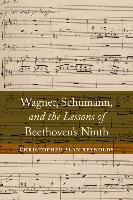- Start
- Wagner, Schumann, and the Lessons of Beethoven's Ninth
Wagner, Schumann, and the Lessons of Beethoven's Ninth
Angebote / Angebote:
"Once again Christopher Reynolds amazes us with his X-ray ears, this time forging what will surely be a permanent link between Schumann and Wagner, two composers often thought incompatible, not least by themselves. Uncovering their common responses to Beethoven’s Ninth and to the music of Bach, as well as Brahms’s response to the two of them (eager and grateful toward the one, covert and grudging toward the other), he reminds us that composers are alive to all sorts of stimuli but react most tellingly to one another’s music. Reading Reynolds is like borrowing his ears and hearing new resonances in music we thought we knew."—Richard Taruskin, author of The Oxford History of Western Music "By illuminating the largely unexplored topic of his interactions with Schumann, this book establishes the terms of a fundamental reassessment of Wagner’s development in the 1840s and 50s. Of particular interest are the specific ways in which Wagner, Schumann, and other romantic composers followed the example of Beethoven’s monumental Ninth Symphony. The story of that work’s formative influence has been told many times, but never before with the degree of insight and musical detail that Christopher Reynolds presents here."—Stephen Hinton, Avalon Foundation Professor in the Humanities, Stanford University, and author of Weill's Musical Theater: Stages of Reform "Music historians have long been aware of two separate stories: one, that Beethoven’s Ninth Symphony exerted tremendous fascination on virtually all later symphonists, the other, that Richard Wagner saw his music drama as the next logical step to be taken after the Ninth. What Christopher Reynolds does in this imaginative and persuasive study is to bring these two stories together and to demonstrate that they are in fact a single story, one that emerged during the fateful 1845–46 meetings between Wagner and Schumann in Dresden."—Karol Berger, author of A Theory of Art and Bach's Cycle, Mozart's Arrow: An Essay on the Origins of Musical Modernity
Folgt in ca. 15 Arbeitstagen
